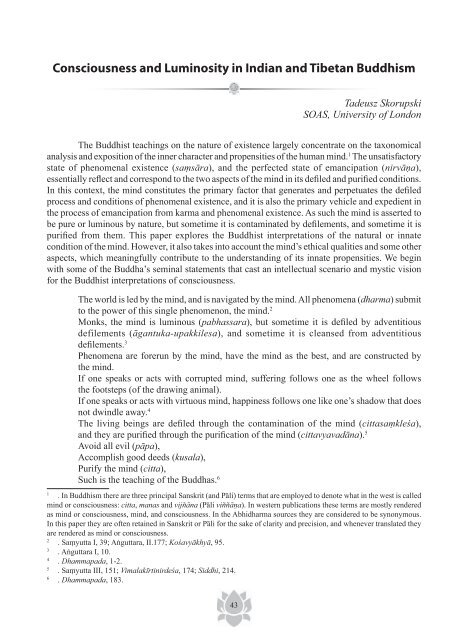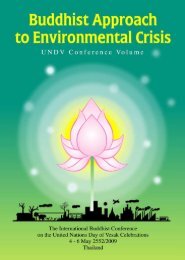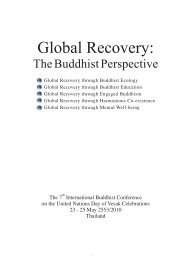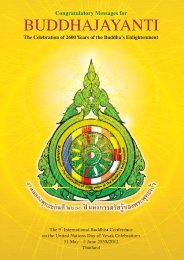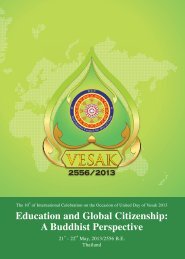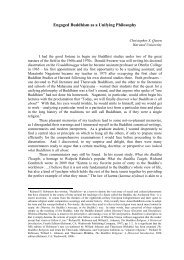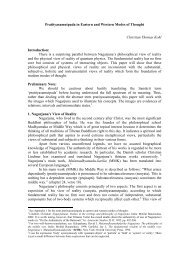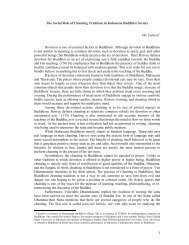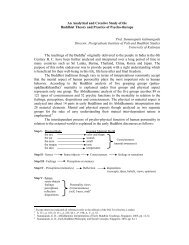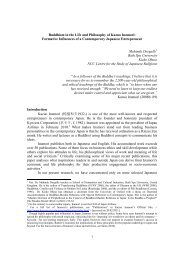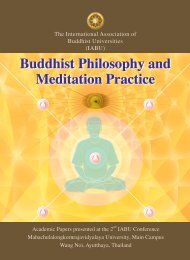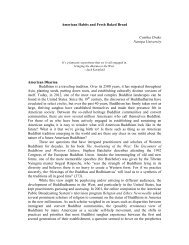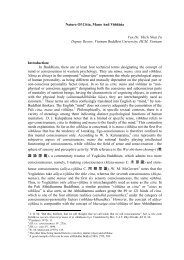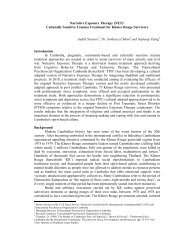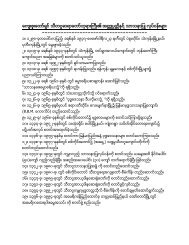- Page 2 and 3:
The International Association of Bu
- Page 4 and 5:
Preface Mahachulalongkornrajavidyal
- Page 6 and 7:
13. Joel Walmsley & Ira Greenberg:
- Page 8 and 9:
2 nd IABU Conf erence: Introduction
- Page 10 and 11:
Ven. Dr. Jinwol Lee’s paper on Se
- Page 12 and 13:
developments in meditative teaching
- Page 14 and 15:
through explaining his teaching thr
- Page 16 and 17: to do with the notion of ‘I’ ne
- Page 18 and 19: and practice is supported by an app
- Page 20 and 21: treatment of the notion of volition
- Page 22 and 23: Problems connected with the tension
- Page 24: Buddhist Philosophy and Meditation
- Page 27 and 28: Conference The main method of medit
- Page 29 and 30: Conference I contend that this way
- Page 31 and 32: Conference putting words to her exp
- Page 33 and 34: Conference passing through one ña
- Page 35 and 36: Conference constructed and is able
- Page 37 and 38: Thought and Praxis in Cotemporary K
- Page 39 and 40: Conference This scripture is a shor
- Page 41 and 42: Conference enlightenment represente
- Page 43 and 44: Conference The Buddha’s birthday
- Page 45 and 46: Conference Monks-oriented Practice:
- Page 47 and 48: Conference Bibliography: Anderl, Ch
- Page 49 and 50: Conference Kim, Jongmyung. 2006b.
- Page 51 and 52: Ganhwaseon () in Korea: From a Seon
- Page 53 and 54: Conference to see one’s true natu
- Page 55 and 56: Conference 3 months. During the per
- Page 57 and 58: The Transformation of Doubt (Ŭijŏ
- Page 59 and 60: Conference a “stream-enterer” (
- Page 61 and 62: Conference meditation unique to Eas
- Page 63 and 64: Conference But Yuanmiao, like many
- Page 65: Conference the sequestered monk. Th
- Page 69 and 70: Conference The above-discussed scho
- Page 71 and 72: Conference from wrong views, and pr
- Page 73 and 74: Conference While the Pli sources id
- Page 75 and 76: Conference enlightenment (bodhipaki
- Page 77 and 78: Conference the conventional bodhici
- Page 79 and 80: Conference • After executing the
- Page 81 and 82: Conference and awakened to its natu
- Page 83 and 84: Conference In terms of its existent
- Page 85 and 86: Conclusion Conference As we have se
- Page 87 and 88: Conference Lamotte, E., trans., L
- Page 89 and 90: Conference is possible, by having r
- Page 91 and 92: Conference The two supermundane met
- Page 93 and 94: Conference Tsongkhapa’s work and
- Page 95 and 96: The Pahāna (Conditional Relations)
- Page 97 and 98: Conference [in Abhidhamma] include
- Page 99 and 100: Conference rebirth-kamma-produced m
- Page 101 and 102: Conference Conditions, paccayas Fac
- Page 103 and 104: Conference In his book on the Pahna
- Page 105 and 106: Conference When we encounter pleasa
- Page 107 and 108: Conference In sum, all three Pahna
- Page 109 and 110: Conference Korneld, Jack (1996) Liv
- Page 111 and 112: A Study on the Development of Medit
- Page 113 and 114: Conference From all above, we can n
- Page 115 and 116: Conference In the 19 th century, ho
- Page 117 and 118:
Conference Someone thought that the
- Page 119 and 120:
Conference 2. The views on enlighte
- Page 121 and 122:
Pragmatic Benefits and Concentratio
- Page 123 and 124:
Conference 3. Evident Importance of
- Page 125 and 126:
Conference piness during practicing
- Page 127 and 128:
Theravada Philosophical Exposition
- Page 129 and 130:
Conference • Four right exertions
- Page 131 and 132:
Conference (cattro ariyamagg), the
- Page 133 and 134:
Conference ABBRIVIATIONS Psm Paisam
- Page 135 and 136:
Conference the Yogcras and Mdhyamik
- Page 137 and 138:
Conference It is clear that my rese
- Page 139 and 140:
Conference experience directly, uno
- Page 141 and 142:
Conference commentary, and the Dzog
- Page 143 and 144:
Conference from the text, and the t
- Page 145 and 146:
Conference Trungpa Rinpoche did not
- Page 147 and 148:
Conference The treatment of the bre
- Page 149 and 150:
Conference At the risk of oversimp
- Page 151 and 152:
The Philosophy of Suffering and the
- Page 153 and 154:
Conference experiences impermanence
- Page 155 and 156:
Conference When mind is concentrate
- Page 157 and 158:
Mind, Death and Supervenience: Towa
- Page 159 and 160:
Conference The reductionist answer
- Page 161 and 162:
Conference equivalent (but differen
- Page 163 and 164:
Conference II. Vajrayā na Perspect
- Page 165 and 166:
Conference of the conventional mind
- Page 167 and 168:
Conference For a period of forty-ni
- Page 169 and 170:
Conference Finally, to return to an
- Page 171 and 172:
Conference Punam, H. (1975) “The
- Page 173 and 174:
Conference This connection with rea
- Page 175 and 176:
Conference Being calm, we will know
- Page 177 and 178:
Conference Thich Nhat Hanh’s (199
- Page 179 and 180:
References: Conference Batchelor, M
- Page 181 and 182:
A Strategic Perspective on Buddhist
- Page 183 and 184:
Conference Sati as such is mere awa
- Page 185 and 186:
Conference on observations and expe
- Page 187 and 188:
Conference that which they represen
- Page 189 and 190:
Conference Buddhism is related to t
- Page 191 and 192:
Conference were disturbed, as in th
- Page 193 and 194:
Conference do. For example, at this
- Page 195 and 196:
Conference Figure 3 An English Spea
- Page 197 and 198:
Conference Consider the relation be
- Page 199 and 200:
Conference ——. Toward Sustainab
- Page 201 and 202:
Conference previous research, espec
- Page 203 and 204:
Conference Mi bskyod rdo rje (1507-
- Page 205 and 206:
Conference remove all veils. This r
- Page 207 and 208:
Conference In temporary summary—t
- Page 209 and 210:
Conference of those who do not trul
- Page 211 and 212:
Conference the teacher as opposed t
- Page 213 and 214:
Conference Session two denes the
- Page 215 and 216:
Conference signicance, in which gen
- Page 217 and 218:
Conference Mi bskyod rdo rje, Karma
- Page 219 and 220:
Conference ——. mNyams med dags
- Page 221 and 222:
Conference Jackson, David P. (1992)
- Page 223 and 224:
Conference —— (2002). ‘What D
- Page 225 and 226:
Searching for a Possibility of Budd
- Page 227 and 228:
Conference We can nd another instan
- Page 229 and 230:
Conference to is not considered a p
- Page 231 and 232:
Conference relationship has its val
- Page 233 and 234:
Conference concepts with the opposi
- Page 235 and 236:
Conference The Mind’s ‘I’ in
- Page 237 and 238:
Conference 2. Preliminary (2): Pah
- Page 239 and 240:
Conference When the scientic attitu
- Page 241 and 242:
Conference ‘the world’s limit
- Page 243 and 244:
Conference ‘appear’, as a pheno
- Page 245 and 246:
Conference being the basis of the c
- Page 247 and 248:
Conference He might say too, ‘The
- Page 249 and 250:
Conference directed towards (or awa
- Page 251 and 252:
Conference really is like a kind of
- Page 253 and 254:
Conference [W]hen a bhikkhu does no
- Page 255 and 256:
Conference The agency of the ‘I
- Page 257 and 258:
Conference 6. Conclusion: Not ‘th
- Page 259 and 260:
References Conference Primary Pli T
- Page 261 and 262:
Conference Husserl, E. [1912-1929]
- Page 263 and 264:
Conference from the gross level to
- Page 265 and 266:
Conference • The First Vijj: Pubb
- Page 267 and 268:
Conference sava or mental intoxican
- Page 269 and 270:
Conference 3.1.1 Trai-sikkh of “P
- Page 271 and 272:
Conference 3.2.1 As for meditation,
- Page 273 and 274:
Conference 4. The Noble Right Conce
- Page 275 and 276:
Conference (Tilakkhaa), Trai-sikkh
- Page 277 and 278:
Conference Diagram illustrates rela
- Page 279 and 280:
Conference In the mainstream Buddhi
- Page 281 and 282:
Conference the primary ña rises. I
- Page 283 and 284:
Conference Vasubandhu and his conte
- Page 285 and 286:
Conference Like others who have inv
- Page 287 and 288:
Conference In the second part of hi
- Page 289 and 290:
Conference cultivation (bhvan-mrga)
- Page 291 and 292:
Conference supramundane paths are s
- Page 293 and 294:
Conference the four noble truths in
- Page 295 and 296:
Conference “unification of mind
- Page 297 and 298:
Conference It’s hard to tell if t
- Page 299 and 300:
Conference Vasubandhu objects to th
- Page 301 and 302:
Buddhadāsa’s Poetry: the Object
- Page 303 and 304:
Conference Emptiness is a means of
- Page 305 and 306:
Conference So we have to leave the
- Page 307 and 308:
Conference I have collected free pi
- Page 309 and 310:
Conference Buddhadsa maintained tha
- Page 311 and 312:
Conference Apart from the metaphor
- Page 313 and 314:
Conference Moreover, many of Buddha
- Page 315 and 316:
Conference For Dharma poetry, it is
- Page 317 and 318:
Conference Because they challenge t
- Page 319 and 320:
Conference No matter how loud the s
- Page 321 and 322:
Conference It is disgusting, but we
- Page 323 and 324:
Conference Until there is no cause
- Page 325 and 326:
An Anthropological Study on the Rit
- Page 327 and 328:
Conference (Buddhist verses) or rec
- Page 329 and 330:
Conference Data Analysis Data has b
- Page 331 and 332:
Conference Table 6: The belief of t
- Page 333 and 334:
Conference Table 11: Solace from th
- Page 335 and 336:
The Philosophical Foundations of th
- Page 337 and 338:
Conference kenky (Studies in “ es
- Page 339 and 340:
Conference Drukpa Kagyu tulku Choeg
- Page 341 and 342:
Conference A less common conception
- Page 343 and 344:
Conference (thugs dam) 8 , when a y
- Page 345 and 346:
Conference Speaking more specically
- Page 347 and 348:
Conference composed by Khri-byang R
- Page 349 and 350:
Conference and exchanged appears to
- Page 351 and 352:
Conference Faure, Bernard. 1995.
- Page 353 and 354:
Conference Sharf, Robert. 2004. ‘
- Page 355 and 356:
Conference Contexts - the instituti
- Page 357 and 358:
Conference NKT lamrim handbook, Joy
- Page 359 and 360:
Conference lifetime’. 21 Liberati
- Page 361 and 362:
Conference hedonism, materialism, o
- Page 363 and 364:
Conference Unfortunately, inducing
- Page 365 and 366:
Conference most of whose specics ar
- Page 367 and 368:
Conference a good friend, then a
- Page 369 and 370:
Conference Conclusions: In conclusi
- Page 371 and 372:
Conference Table 1: The sequence of
- Page 373 and 374:
The Practical approach to the Enlig
- Page 375 and 376:
Conference Many writings say that S
- Page 377 and 378:
Conference Those were in the histor
- Page 379 and 380:
Conference Arahant has no-self ther
- Page 381 and 382:
Buddhist Meditation Practices Dr. W
- Page 383 and 384:
Conference However, certain people
- Page 385 and 386:
Conference the three-fold factors d
- Page 387 and 388:
Conference According to Tantra, all
- Page 389 and 390:
Breathing Mindfulness: Text and Pra
- Page 391 and 392:
Conference the eyes, though this is
- Page 393 and 394:
Conference communicated by the use
- Page 395 and 396:
Conference felt to be appropriate f
- Page 397 and 398:
Conference the day is encouraged. N
- Page 399 and 400:
Conference Abbreviations: AS = npna
- Page 401 and 402:
Conference Nan, H-C. 1997. Basic Bu
- Page 403 and 404:
Conference Having truly puried the
- Page 405 and 406:
Conference 2.2 The practice of #1-1
- Page 407 and 408:
Conference 2.2.2 The process of pra
- Page 409 and 410:
Conference The more moral empowerme
- Page 411 and 412:
Conference If the theoritical knowl
- Page 413 and 414:
Conference Diagram illustrating the
- Page 415 and 416:
Conference 3.1.4 The fourth task in
- Page 417 and 418:
Conference 3.3.3 The three moral em
- Page 419 and 420:
Conference The progress of which re
- Page 421 and 422:
Conference Diagram Showing Relation
- Page 423 and 424:
Conference This article only explai
- Page 425 and 426:
Conference The discourse(s) on karm
- Page 427 and 428:
Conference Other signicant differen
- Page 429 and 430:
Conference karma, nd further suppor
- Page 431 and 432:
Conference unwholesome actions, tha
- Page 433 and 434:
Conference In the case of the instr
- Page 435 and 436:
Conference Table 2: The appma seque
- Page 437 and 438:
Conference birth; the end of karma
- Page 439 and 440:
Conference that come into being in
- Page 441 and 442:
Conference the abandonment of the l
- Page 443 and 444:
Conference “the cultivation of th
- Page 445 and 446:
References Conference Anlayo 2003:
- Page 447 and 448:
Conference Mukai, Akira 1985:“
- Page 449 and 450:
A Study of the Meditation Methods i
- Page 451 and 452:
Conference Other subjects discussed
- Page 453 and 454:
Conference Kakilananda followed. Th
- Page 455 and 456:
Conference In brief, in the Mtu, th
- Page 457 and 458:
Conference (No.4) An Epitome of Med
- Page 459 and 460:
Conference Also: Table B (in chrono
- Page 461 and 462:
Conference The frequent mention of
- Page 463 and 464:
Conference In order to have aversio
- Page 465 and 466:
Conference 6.2. The methods of medi
- Page 467 and 468:
Conference The Four of the of the F
- Page 469 and 470:
Conference In the DESM, the meditat
- Page 471 and 472:
Conference According to the Visuddh
- Page 473 and 474:
Conference Articles of the Practice
- Page 475 and 476:
Conference ABBRE VIATIONS “T.”
- Page 477 and 478:
The Philosophical Perspectives in t
- Page 479 and 480:
Conference became integrated into B
- Page 481 and 482:
Conference “He who sees how thing
- Page 483 and 484:
Conference The purpose of visualiza
- Page 485 and 486:
Conference This helps in the actual
- Page 487:
References: Conference Mahayana Tan


